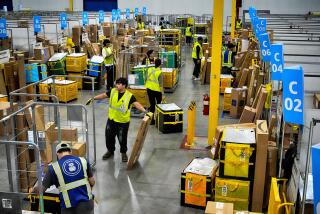U.S. economy grew late last year, but barely
WASHINGTON -- The U.S. economy barely grew late last year, thanks largely to a plunge in federal defense spending that in part was likely preparation for the budget cuts under the so-called sequestration.
The nationâs gross domestic product, or the total value of all goods and services produced, rose by a measly 0.1% in the fourth quarter, according to the Commerce Departmentâs latest calculations released Thursday. The governmentâs first estimate said inflation-adjusted GDP shrank 0.1% in the final three months of last year.
Analysts were expecting the quarterly GDP growth rate to be brought up to about 0.5% on average. GDP grew by 3.1% annualized in the third quarter of last year.
Still, economists did not seem troubled by the modest revision, noting the unusually steep 22% annualized fall in defense spending in the fourth quarter. The stagnant GDP rate also reflected a big slowdown in business inventories, suggesting that companies may produce more in coming months to stock up on goods that have been run down.
Also belying the overall poor GDP growth were strong numbers for business investments, particularly residential investment, which jumped 17.5% at an annual rate. Private spending also increased by a decent 2.1%, slightly better than the third quarter.
Federal Reserve Chairman Ben S. Bernanke said this week that the flattening of the GDP growth rate late last year wasnât a sign of an economy that had stalled. Rather, he attributed it to weather-related disruptions and other transitory factors.
Thatâs the good news. The bad news is that the economy continues to grow at a mediocre pace of about 2%, well below what Bernanke and other experts see as the potential for the economy and what is needed to bring down the unemployment rate more quickly.
Whatâs more, the fiscal budget cuts set to take effect Friday under the sequester will put further weight on an economy that just canât seem to gain much speed. GDP has grown on average by a little over 2% a year since the Great Recession officially ended in mid-2009.
Many economists expect GDP to advance by no more than that in the the first half of this year, and, if there are no big surprises, to pick up momentum in the second half as the effects of the tax increases this year and budget cuts fade and the economy benefits from a recovering housing market and the improvement in consumer finances and credit flows.
Still, that is a big âif.â Thereâs little indication that the political budget battles will ease anytime soon, and higher oil prices and renewed concerns about the Eurozone debt crisis have made the near-term outlook even more uncertain.
ALSO:
Housing starts fall sharply at start of year
Bernanke warns Congress that budget cuts pose danger
Most economists see âsequestrationâ budget cuts as unavoidable
More to Read
Inside the business of entertainment
The Wide Shot brings you news, analysis and insights on everything from streaming wars to production â and what it all means for the future.
You may occasionally receive promotional content from the Los Angeles Times.











